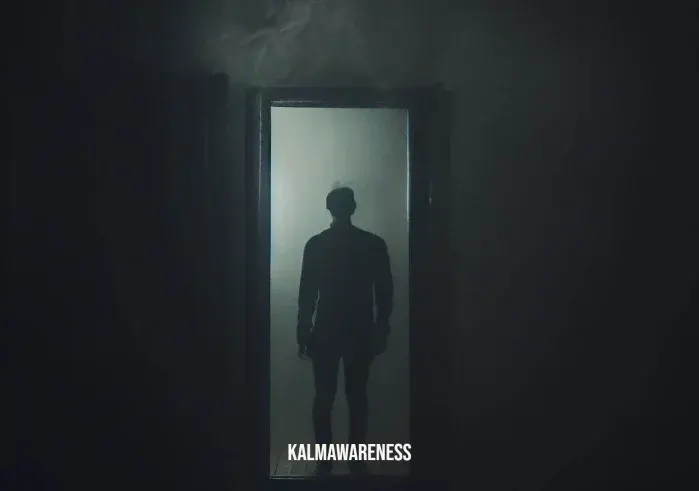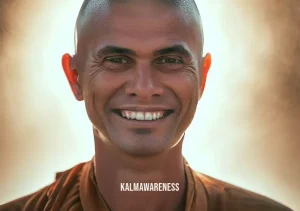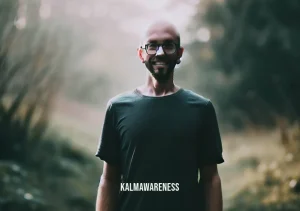Why Don’t I Recognize Myself in the Mirror? An Exploration of Self-Perception and Identity
Have you ever stood in front of a mirror and thought, “why don’t I recognize myself in the mirror?” This uncanny feeling of estrangement from one’s own reflection isn’t uncommon, and it draws us into an exploration of self-perception, identity, reflection, body image, and mindfulness.
Understanding Self-Perception and Identity
Self-perception refers to the way in which we view ourselves. This perspective can be influenced by various factors, including physical appearance, personal beliefs, social roles, and interactions with others. When looking into a mirror, the image we see may sometimes feel foreign or unfamiliar. This experience, often termed as mirror-image perceptions, can be deeply unsettling, leading to a questioning of one’s identity.
However, self-perception isn’t just about the physical. The Buddha quotes about self provide a philosophical perspective, suggesting that our sense of self extends beyond physicality into the realms of beliefs, thoughts, and emotions. This suggests that our mirror images are just a part of a much broader concept of self-identity.
Reflections and Body Image
When we ask “why don’t I recognize myself in the mirror?”, we’re often dealing with issues of body image. A distorted body image can result from societal pressures, personal beliefs, or mental health conditions. You may notice that you look different in every mirror, further compounding the feeling of unfamiliarity.
Understanding this complexity can be aided by mindfulness practices. For instance, try the mirror activity outlined on our site, which encourages a more mindful, accepting relationship with one’s reflection.
Navigating the Complexities of the Mirror Image
“The mirror reflects all things beautifully, but it does not produce or possess beauty itself. As such, our reflections should not be the defining factor of our beauty or self-worth.” – Unknown
This quote perfectly captures the crux of our discussion. If you’ve ever thought to yourself, “I look good in the mirror,” only to later feel like you “don’t recognize myself in the mirror,” it’s essential to remember that the mirror merely shows a perspective, not an absolute truth.
When we confront the question, “when you look in the mirror, what do you see?”, we must remind ourselves that our reflections are not the entirety of our identities. Beyond our physical appearance lie our thoughts, values, experiences, and capabilities, all integral to who we are.
I invite you to continue to the next part of this enlightening article, where we’ll delve deeper into the psychological factors influencing our self-perception and provide practical advice on cultivating a healthier relationship with the mirror.

Psychological Aspects of Self-Perception
Understanding the psychological aspects of why we sometimes don’t recognize ourselves in the mirror involves a multifaceted approach. In this context, several theories and psychological phenomena come into play:
- Body Dysmorphic Disorder (BDD): This mental health disorder involves an obsessive focus on a perceived flaw in appearance, often leading to a distorted self-image, where the affected person may not recognize themselves in the mirror. Find more about BDD and similar issues in our collection on self-esteem and the mirror.
- Depersonalization-Derealization Disorder: People with this disorder often feel detached or disconnected from themselves, causing them to feel as if they’re observing themselves from an outside perspective. When this extends to their mirror image, they may fail to recognize it as their own. Explore this complex issue in the piece, can you not be yourself for 5 minutes?
- Capgras Delusion: This rare disorder, usually associated with severe mental illness or brain injury, makes people believe that someone they know or themselves has been replaced by an imposter. This could extend to their reflection in the mirror, causing a sense of unfamiliarity.
- Mood Disorders: Depression or anxiety can alter self-perception and cause a disconnect between the perceived self and the person in the mirror. If you are feeling low or anxious, it’s common to feel as if you’re not feeling yourself.
Finding a Path to Self-Recognition
Now that we’ve looked at some of the potential causes of feeling disconnected from your mirror image, let’s delve into strategies that might help you reconnect with your reflection. This encompasses various practices and mindfulness techniques, including:
- Meditation: Regular meditation can help in calming the mind and enhancing self-awareness. Whether it’s the powerful I Am That I Am meditation, or the serene Dalai Lama’s daily prayer, these exercises can cultivate a deeper connection with oneself.
- Affirmations: Positive affirmations serve as a powerful tool for building self-esteem and self-recognition. Try to look in the mirror each morning and remind yourself of your unique qualities and strengths.
- Self-Compassion: Being kind to oneself can help in developing a more realistic and positive self-image. Check out our post on why you are your biggest critic, and learn how to cultivate more self-compassion.
Understanding Mirror-Image Misidentification
| Phenomena | Description | Related Article |
|---|---|---|
| Body Dysmorphic Disorder | Obsession over a perceived physical flaw causing a distorted self-image | Self-Esteem & The Mirror |
| Depersonalization-Derealization Disorder | Feeling detached or disconnected from oneself | Can You Not Be Yourself For 5 Minutes? |
| Capgras Delusion | Believing that someone, possibly including oneself, has been replaced by an imposter | N/A |
| Mood Disorders | Altered self-perception due to conditions like depression or anxiety | Not Feeling Yourself |
In the next part of this article, we will continue exploring the topic of self-perception and the mirror, focusing on spiritual and philosophical perspectives. You can expect thought-provoking insights from diverse sources like Buddha, Bertrand Russell, and the Dalai Lama. Stay tuned for a deeper understanding of why sometimes you don’t recognize yourself in the mirror.

Spiritual and Philosophical Perspectives on Self-Perception
In our quest to comprehend why we sometimes don’t recognize ourselves in the mirror, it’s crucial to consider perspectives beyond the clinical and psychological. A spiritual or philosophical viewpoint offers profound insights into our understanding of the self and its reflection.
The Buddha’s Teachings on Self-Perception
The teachings of Buddha offer an interesting perspective on self-perception. Buddha believed in the concept of “Anatta” or “non-self,” suggesting that the concept of a permanent, unchanging self is an illusion. This belief may be enlightening when contemplating why one might not recognize oneself in the mirror.
In Buddha’s teachings, he asks his disciples to meditate upon the notion of self, suggesting that the constant change and impermanence of our physical and mental states make it impossible to hold onto a fixed concept of ‘I’. It is this process of constant change that can lead to moments of not recognizing ourselves in the mirror.
Our resource on Buddha’s daily meditation offers a closer look at these spiritual practices. Furthermore, our collection of Buddha quotes about self presents a rich tapestry of ideas for self-reflection.
Bertrand Russell’s View on Aging and Self-Identity
Renowned philosopher Bertrand Russell provides an interesting perspective on self-perception, particularly in the context of aging. Russell posited that as we age, we inevitably change, both physically and mentally. This transformation could lead to a disconnection between the current self and the self-image ingrained in our memory, causing us not to recognize ourselves in the mirror.
Russell advises adopting a flexible mindset towards our self-image, acknowledging the inevitability of change and the fluidity of our identity. Understanding and accepting this can help bridge the gap between our mirror image and self-perception. To delve deeper into Russell’s philosophical insights, visit our page dedicated to Bertrand Russell: How to Grow Old.
Dalai Lama: Embracing Change and Accepting the Self
His Holiness the Dalai Lama, a global icon of peace and compassion, offers wisdom on self-acceptance and embracing change. In the Dalai Lama’s teachings, he emphasizes the importance of self-awareness and compassion towards oneself.
In the context of not recognizing oneself in the mirror, the Dalai Lama might suggest this as a moment of introspection, an opportunity to meditate upon our changing selves. He might stress that recognizing oneself is not just about the physical image but also about understanding our inner growth and transformation.
You can explore more of Dalai Lama’s teachings and meditations on self-recognition and self-growth on our pages Dalai Lama Meditations and Dalai Lama Prayer.
In our concluding chapter, we will explore practical exercises to enhance self-perception and mirror self-recognition, incorporating mindfulness techniques, body image, and positive affirmations. Get ready to delve deeper into self-reflection practices like mirror activity and insightful resources like “Your Real Self” book, aiming to help you reconcile your self-image with the person you see in the mirror.

Practical Ways to Enhance Self-Perception and Mirror Self-Recognition
As we journey towards understanding the question, “Why don’t I recognize myself in the mirror?”, we’ve considered psychological explanations, delved into spiritual and philosophical perspectives, and now it’s time to explore some practical methods to enhance our self-perception and mirror recognition.
Mirror Activity: A Path to Self-Awareness
Mirror activity is a powerful tool for self-discovery and developing a robust self-image. It involves spending time alone with your reflection, making eye contact, observing every detail, and acknowledging the person you see in the mirror. Our page on Mirror Activity provides a comprehensive guide to undertaking this practice.
Mindfulness Meditation: Grounding in the Present
Mindfulness meditation is another practical technique to connect with our current selves. By focusing on our breath, sensations, thoughts, and feelings, we can develop a deeper understanding of who we are in the present moment. This awareness can assist us in recognizing ourselves when we look in the mirror. Check out our I Am That I Am Meditation for an effective mindfulness practice.
Positive Affirmations: Strengthening Self-Image
Positive affirmations are simple, positive statements that we can say to ourselves, helping to challenge and overcome self-sabotaging thoughts. When we repeat them often and believe in them, we can start to make positive changes, including reinforcing a healthy self-image.
As the great philosopher Bertrand Russell said, “The good life is one inspired by love and guided by knowledge.” Applying this wisdom, we can adopt affirmations like, “I love and accept myself as I am” and “I acknowledge my growth and transformation.” Visit our article on Self-Esteem Mirror for more tips on using affirmations for self-acceptance and self-love.
To highlight the effectiveness of these practices, let’s consider the following table illustrating how they can influence self-perception and mirror recognition.
| Practice | Influence on Self-Perception | Influence on Mirror Recognition |
|---|---|---|
| Mirror Activity | Enhances self-observation | Encourages recognition of physical changes |
| Mindfulness Meditation | Cultivates present-moment awareness | Fosters connection with current self |
| Positive Affirmations | Improves self-image | Reinforces acceptance of mirrored self |
As we wrap up this in-depth exploration of why we sometimes don’t recognize ourselves in the mirror, we’ll touch on the profound wisdom of famous thinkers, spiritual insights, and the science of self-perception. We’ll also share some parting thoughts and further resources for those seeking to understand this complex phenomenon better. Prepare to delve into a wealth of knowledge with insights from Wendy O’Leary, Bertrand Russell, and the age-old wisdom of the “I am a mirror” concept.

The Wisdom of Reflection: Self-Perception and Transformation
Now that we’ve ventured through psychological, spiritual, and practical perspectives, let’s culminate our exploration of “Why don’t I recognize myself in the mirror?” by delving into the realm of profound wisdom, and the transformative power of self-perception.
Philosophical Insights: The Changing Self
The renowned philosopher Bertrand Russell astutely observed that our perception of self isn’t static, but rather evolves over time, much like our physical form. This wisdom is illuminated in his essay Bertrand Russell: How To Grow Old where he elucidates how our changing self-perception reflects the richness of our life experiences.
The Metaphor of the Mirror: Self-Perception and Personal Growth
The mirror metaphor in spiritual and philosophical contexts teaches us that our reflections offer us more than a mere physical representation, but an opportunity to engage with our inner selves. In our page on the I Am a Mirror concept, we explore this metaphor’s deeper significance in self-perception and personal growth.
Self-perception Through Mindful Contemplation
The act of reflecting on our inner selves, our qualities, values, and how they change with time, plays a crucial role in self-perception. Our article on Mindfulness provides insights into how mindfulness practices can aid us in recognizing and accepting our evolving identities.
**”The greatest discovery of any generation is that a human being can alter his life by altering his attitude.” – William James
This powerful quote underlines the transformative potential that changing our attitudes and perspectives hold. It underscores why developing a positive mindset can help us better recognize ourselves in the mirror, accepting both our physical changes and inner growth.
The Role of Self-Criticism
It’s important to note that while introspection can lead to growth, too much self-criticism can distort our self-perception, leading to feelings of non-recognition. Our article, You Are Your Biggest Critic, discusses this phenomenon and offers guidance on mitigating self-criticism.
As we navigate through our dynamic lives, filled with personal transformations, changes, and self-discoveries, we may occasionally ask ourselves, “Why don’t I recognize myself in the mirror?” Through our exploration of this topic, we’ve learned that it’s a natural part of our human experience, deeply intertwined with our ever-evolving self-perception.
Our self-perception journey is an ongoing process, one filled with rich introspection, self-discovery, and potential for personal growth. While it may at times be puzzling or even disconcerting to not recognize ourselves in the mirror, understanding the underlying factors can pave the way towards acceptance and self-love.
As we conclude, take a moment to reflect upon a profound quote by the Buddha:
**”You yourself, as much as anybody in the entire universe, deserve your love and affection.” – Buddha
Let this wisdom guide your journey of self-perception and self-recognition. Be kind to yourself, practice self-compassion, and embrace the dynamic, transforming being that you are.
For more insights on self-perception, self-acceptance, and personal growth, delve into the various articles and guides available at Kalm Awareness. Embrace the journey of self-discovery, and remember, every reflection offers an opportunity for deeper self-understanding.

The Final Reflection: Embracing Change and Celebrating Growth
In our journey of self-discovery and personal growth, we’ve dived deep into understanding “why don’t I recognize myself in the mirror?” Let’s now shed light on embracing change, celebrating our growth, and how these can alter our self-perception in a liberating way.
Recognizing Change: An Inevitable Part of Life
Change is a constant and inevitable part of life. We grow, we learn, we evolve – these transformations are natural and beautiful. Wendy O’Leary, a mindfulness educator and author, shares insightful thoughts on acknowledging and embracing change in her work. Understanding that change is a natural part of existence helps in easing the shock of not recognizing ourselves in the mirror.
Celebrating Personal Growth: Reflecting on Achievements and Progress
Our journey through life is also marked by personal growth and self-improvement. Every new skill we learn, every obstacle we overcome, adds a layer to our evolving self-perception. Sharon Loving, a seasoned life coach, provides enlightening perspectives on celebrating our achievements and recognizing our personal growth.
Mirrors as Tools for Self-Love and Acceptance
If you’ve ever wondered, do we look like what we see in the mirror?, it’s crucial to realize that mirrors, in essence, reflect more than just our physical appearance. They are tools for self-love, acceptance, and affirmation. As we grow and evolve, they mirror back our resilience, strength, and personal transformations.
Light and Liberation in Self-Perception
Embracing our reflections is a liberating journey, one where we reconcile with our evolving identities and celebrate the uniqueness that makes us who we are. Our page on Buddha Quotes About Self offers timeless wisdom on self-perception and acceptance.
“To be beautiful means to be yourself. You don’t need to be accepted by others. You need to accept yourself.” – Thich Nhat Hanh
This quote from Thich Nhat Hanh encapsulates the essence of self-perception. It teaches us that beauty is found in authenticity, in being true to ourselves, and in accepting our unique selves, including our ever-evolving reflections.
We hope our exploration of “why don’t I recognize myself in the mirror?” has shed light on self-perception, personal growth, and self-acceptance. Remember, the mirror is not just a reflective surface; it is a gateway to understanding and embracing our evolving identities.
In conclusion, cherish your reflection, for it is a testament to your resilience, strength, and the remarkable journey you’ve undertaken. Celebrate your transformations, and remember, every change is a step towards personal growth and self-discovery.
We at Kalm Awareness invite you to continue exploring these themes in other articles and resources available on our site. Dive deeper into the myriad topics that enrich our understanding of self-perception and personal growth. May your journey of self-discovery be filled with love, acceptance, and profound insights!




